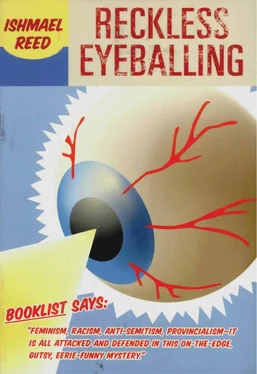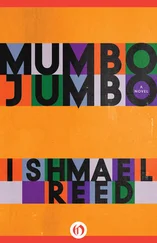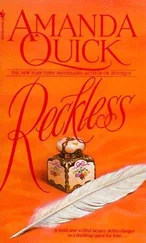The place was full of commuters who were gulping down oysters and crackers. Finally somebody said, “Mr. Ball.” He looked up. She was standing there. Her skin was smooth and had a tapioca color. She wore a white turbanlike headpiece, earrings that dangled, bright red paint on her lips, which seemed in a puckered state. She wore black beads around her neck and the kind of skirt women wear in the Caribbean marketplace. She dressed like Carmen Miranda and had Carmen Miranda’s sexy eyes.
“When they find that nigger I hope they put him under the jail.” She sat down. “He walked about the room calling me a collaborator before he did it. Said that the French knew how to punish traitors.”
“Brashford said that throughout history when the brothers feel that they’re being pushed against the wall, they strike back and when they do strike back it’s like a tornado, uprooting, flinging about, and dashing to pieces everything in its path. A tornado has no conscience. He says the fellas feel that they are catching it from all sides.”
“What else would a senior male chauvinist like Brashford say? He’s just a fifth-rate O’Neill anyway, and his opinions about women are just like O’Neill’s. We’re all whores to them. I’m really surprised that you seem to be agreeing with him.” She went into her bag and removed a small gun. “I was always a pacifist, always sympathizing with these guys, but if one of them tries that again, I’m going to blow him away.” Sympathize, Ball thought. By the end of Wrong-Headed Man , the lead villain has screwed his children, sodomized his missionary wife, put his mother-in-law in bondage, performed bestial acts with pets, and when the police break down the door he’s emptied the fish bowl and is going after the fish.
“Get me a bowl of oyster stew and some crackers, and I think I’d like a bottle of Löwenbräu Light.” She threw a hundred-dollar bill at him. As he rose to comply with her wish, a white man who could have been created by Sloan Wilson approached the table. He wore a blue three-piece suit without a trace of lint, black cordovan shoes, manicured nails. He was clean-shaven. As Ball started toward the order counter, he heard the man ask was she Tremonisha Smarts. He turned and she was signing the man’s autograph and grinning. A European-American man came and took his order. He brought it back. “Isn’t that Tremonisha Smarts sitting over there?” He told the man that it was, the man made a smart aleck grin like James Dean’s, looked him up and down and said, no charge. “I loved that play,” he said. He came back and set down the tray bearing Tre’s requests and his shrimp cocktail.
She threw the script onto the table.
“I brought this script to you. I’ve red-penciled all of my suggestions; of course you’ll have the final say so of what goes, and what’s to be added. I think that the characters need more definition.” She paused and stared into his eyes after that sentence. He looked away. “We’re going to have to cut down on some of the props and costumes. Becky said they’re reducing the original budget for the play.”
“But Jim said that the budget was already skin and bones.”
“Look, I just work here.” You can say that again, Ball thought.
“Becky wants to put all of her money into Eva Braun’s play. You ready for that? Now, I want you to take the script home and go over my corrections, I mean, my suggestions.” You were right the first time, Ball thought. “And give me a call. We’ll meet at my place early next week.” She handed him her card.
The doorman at Tremonisha’s apartment building was Randy Shank, the first playwright who’d made the theater feminists’ sex list in the 1960s. The one who’d gotten into trouble with his satire The Rise and Fall of Mighty Joe Young , whose premise was that American women craved to be raped by a beast. The play not only caused problems for the author but for one of the male critics who’d given it a good review. Feminists had the man followed. The women who dated him were harassed outside their apartment buildings by something calling itself “the feminist education committee,” whose members shouted all kinds of rotten things about the critic as these women attempted to enter and leave their homes. The feminists ransacked his office and smeared blood all over his typewriter and papers. Ball was surprised to see Randy because he’d heard that Randy had left for Europe. He’d heard rumors about Randy and his travels through Amsterdam and Brussels. How women waited for him in shifts at his favorite cafés. Shank was stroking his chin and looking Ball up and down. He frowned and folded his arms. He still walked with his shoulders stooped. In his doorman’s outfit he resembled a World War I Ukrainian general.
“Randy, what are you doing here?” Ball asked.
“Well. It talks,” he said, glowering. “You weren’t so friendly the other night. I caught you down in the East Village on Avenue A. I called and you didn’t even turn around to acknowledge me. And that woman you were with. She looked like a bat out of hell. Had that next-wave shit all over her face and one side of her hair dyed blond, the other looking like a rooster had slept on it. What were you, high, or something?”
Funny line coming from a guy who in the sixties was so full of heroin he couldn’t stand up, Ian thought. “I don’t know what you’re talking about,” he said.
“It was Tuesday night, at about eleven A.M. down in the Village. Avenue A. You walked right by me.”
“I was working on my script Tuesday night; I didn’t even come out of the house.”
“Well, if it wasn’t you, somebody was wearing your face.” All of the fellas were saying that something had happened to Shank in Europe. That there had been a personality change. Maybe he was beginning to see apparitions.
“I thought you were in Europe,” Ball said, hoping to steer the conversation in a different direction.
“Oh, that. I got into a lot of hassles. Man, as soon as Tremonisha’s plays and those other feminist bitches’ books started to get translated into foreign languages, the women in these countries began to come down hard on black men. With the missiles and the strong dollar, anti-Americanism is very rife.”
“Look, I,” Ball reached into his pocket.
“I don’t need your money,” Shank sneered. “I make enough here. Got me a one-bedroom up on West End. I’m saving my money and I’m going to stage my new play myself. That way I’ll have independence and won’t have to rely on these downtown Jews to get my stuff over. I won’t have to kiss anybody’s ass to get over.”
Ball lifted the man from his feet. Ball may have been from the South, but he knew about Afro-American signifying. “What do you mean by that?” he said, ready to punch Shank.
“Nothing, man. I don’t mean nothing.” Ball let him down.
“Man, you country niggers are sure paranoid. Every time somebody say something, you think they talking about you. I just be hearing things, that’s all,” he said, brushing himself off.
“Hearing what things?”
“Aw, man. You know there’s always going to be talk. They say that you’ve given in to those dykes over there at the Mountbatten and that—” Shank covered his grin. “They say that now that the Jew boy, your security, has disappeared, Tremonisha”—he started to laugh aloud—“Tremonisha Smarts is directing your play.” Shank doubled over, holding his gut, he was laughing so.
Ball thought for a moment. “So what’s wrong with that?” Ball said, weakly. “She’s a competent director.”
“Aw, man, you know the reason the white boys love her so. It’s because she portrays black men as hurried, inattentive lovers, and then there’s that scene where this brute throws the woman down the stairs. They love that. That’s all the white boys talk about. Man, do they cream behind that. They love stuff showing black dudes as animalistic sexual brutes because that’s what they are. Just like when they called people cannibals. They’re the biggest cannibals there are. They’ve cannibalized whole civilizations, they’ve cannibalized nature, they’d even cannibalize their own mothers.” Ball had heard this speech a million times over the years in New York.
Читать дальше












